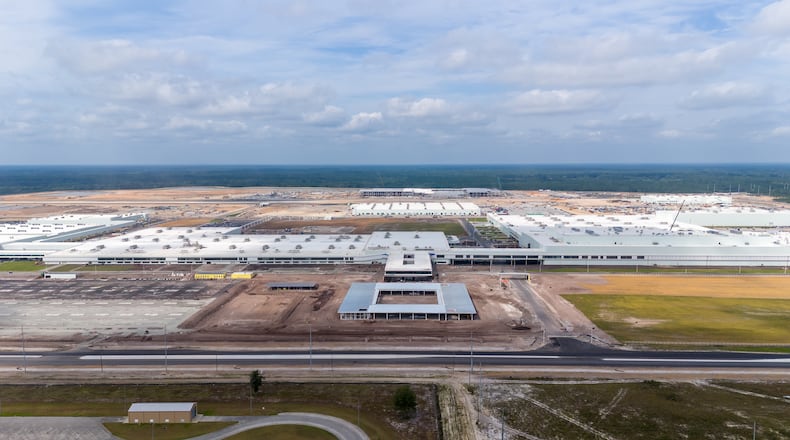STATESBORO ― For farmers, homeowners and other residents of Bulloch County worried about a massive electric vehicle plant plant sucking up millions of gallons of water from beneath their feet, Monday marked “a day of last resort.”
A group of residents calling themselves the Bulloch Action Coalition launched a petition drive aimed at blocking the drilling of four water wells along the county’s border with Bryan County. Those connections to the Floridan Aquifer would provide water to Hyundai’s EV and battery factory, which is nearing completion at a Bryan County site about five miles east of the proposed wells.
The 16-million-square-foot Hyundai Metaplant could begin production as soon as Oct. 1, eventually employing 8,500 workers once fully built out later this decade. The plant, in a rural area about 25 miles west of downtown Savannah, will rely on lots of nearby water to operate.
The petition push is meant to trigger a pair of ballot referendums allowed under the citizens’ referendum clause of the Georgia constitution. Similar initiatives led to a 2022 vote in Camden County that blocked a proposed spaceport and to a referendum scheduled for Oct. 1 in McIntosh County that seeks to overturn a zoning ordinance change passed last year that allows for bigger houses on Sapelo Island.
The “Stop Hyundai Wells” movement is a last-ditch effort by opponents concerned that the wells would lower levels in the aquifer enough to cut off their water supply. The four planned wells are proposed to draw as much as 6.6 million gallons of water a day, and an agreement signed by the Bulloch County Commission in June cites the potential for two additional wells.
The aquifer sources would also supply water to new development around the factory as well as to Bulloch County residents and businesses, although only about 5% of the daily draw is reserved for Bulloch.
Contacted regarding the petition drives, officials with the Savannah Harbor-Interstate 16 Corridor Joint Development Authority, or Savannah JDA, said they remain confident that the water commitments made to Hyundai will be fulfilled. The Savannah JDA manages the factory site in coordination with the state and promised to provide Hyundai with access to water as part of the lease agreement.
”We stand firm on our commitment and all the work we’ve done for 10 years to get water to this site as well as what we’ve done with the governing boards and the county leaders,” said Trip Tollison, who heads the Savannah JDA and is the CEO of the Savannah Economic Development Authority.
Credit: Adam Van Brimmer/AJC
Credit: Adam Van Brimmer/AJC
Several members of the Bulloch Action Coalition have been protesting the wells for two years. Leaders of the group include three residents who earlier this year won election primary victories against incumbents on the Bulloch County Commission, the governing body that approved two measures required in order for the well-drilling to proceed.
The coalition hopes to challenge those commission decisions through the referendums.
“In Camden County, their county commissioners decided they were not going to listen to the people. So the people rose up, they got petitions, and they passed a referendum,” said Lawton Sack, the Bulloch Action Coalition’s co-founder. “The same thing is going to happen here in Bulloch County.”
The coalition needs approximately 4,500 signatures from registered Bulloch County voters to force the referendums. Sack said they would seek 6,000 and would hold petition signing events in “every precinct in the county” if necessary.
The first two opportunities are this week, including at a public meeting regarding the proposed wells hosted by the Georgia Environmental Protection Division. That gathering, scheduled to allow comments on EPD’s draft permits for the proposed new wells, is at 6 p.m. Tuesday at Southeast Bulloch High School. The other is at 6 p.m. Thursday at a pizzeria, Little Nicky’s, in Brooklet.
Credit: Stephen B. Morton for The Atlanta Journal Constitution
Credit: Stephen B. Morton for The Atlanta Journal Constitution
Coalition leader David Bennett, who in May won election as the Bulloch County Commission chair and will take office in January, predicted success in the petition signature drive. Opposition to the Hyundai wells was at the center of his campaign, and he received 5,100 votes to upset the incumbent, Roy Thompson.
Organizers offered few details on the timeline to get the challenges on the ballot. Once the Bulloch Action Coalition submits the signed petitions, Bulloch County has 30 days to verify the signatures. From there, the petitions are reviewed by a probate court judge, who would be tasked with ordering the referendums.
Getting the issue on the November general election ballot is highly unlikely, Sack said. Other citizens’ referendums, such as those in Camden and McIntosh counties, have been scheduled as standalone special elections.
Time is short, coalition leaders emphasized Monday. The Georgia EPD’s public comment period on the draft permits closes with Tuesday’s meeting at Southeast Bulloch High School, and the hearing is typically the final step before permits are issued.
From there, drilling of the wells can commence, and Hyundai is projected to need water from two of those sources by the middle of next year. Test car production is already underway at the plant.
Most of those who spoke at a news conference announcing the petition drives Monday cited frustration with Bulloch County resources being used largely for residents, businesses and an industrial tenant — Hyundai — located in a neighboring county.
The wells are planned for Bulloch because the state is barred from issuing new permits in Bryan County. Bryan, along with Chatham County and part of Effingham County, sit atop an area of the Floridan Aquifer that has previously experienced a decrease in water levels. The water table has recovered significantly in the past two decades but withdrawals remain strictly limited.
The Bryan restrictions do not apply in Bulloch County, and the proposed wells are all located near the boundary between the two counties.
Ryan Brannen, a farmer and a Bulloch County Commission candidate, compared the push to use Bulloch water to meet the needs of Bryan County and Hyundai to a “dog pooping in every corner with no fear of consequences.”
Brannen added: “We have state and local leaders who have been tone deaf to the plight of the farmers and citizens alike.”
About the Author
Keep Reading
The Latest
Featured






